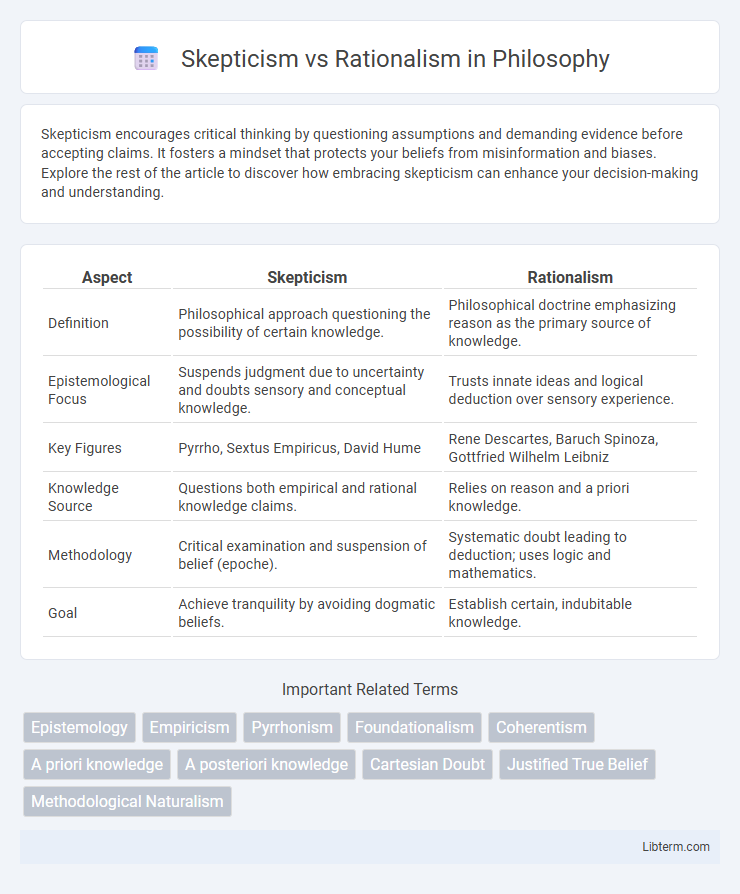Skepticism encourages critical thinking by questioning assumptions and demanding evidence before accepting claims. It fosters a mindset that protects your beliefs from misinformation and biases. Explore the rest of the article to discover how embracing skepticism can enhance your decision-making and understanding.
Table of Comparison
| Aspect | Skepticism | Rationalism |
|---|---|---|
| Definition | Philosophical approach questioning the possibility of certain knowledge. | Philosophical doctrine emphasizing reason as the primary source of knowledge. |
| Epistemological Focus | Suspends judgment due to uncertainty and doubts sensory and conceptual knowledge. | Trusts innate ideas and logical deduction over sensory experience. |
| Key Figures | Pyrrho, Sextus Empiricus, David Hume | Rene Descartes, Baruch Spinoza, Gottfried Wilhelm Leibniz |
| Knowledge Source | Questions both empirical and rational knowledge claims. | Relies on reason and a priori knowledge. |
| Methodology | Critical examination and suspension of belief (epoche). | Systematic doubt leading to deduction; uses logic and mathematics. |
| Goal | Achieve tranquility by avoiding dogmatic beliefs. | Establish certain, indubitable knowledge. |
Introduction to Skepticism and Rationalism
Skepticism involves questioning the certainty of knowledge by doubting the validity of beliefs and requiring strong evidence before acceptance. Rationalism emphasizes reason as the primary source of knowledge, relying on logical deduction and innate ideas rather than sensory experience. Both philosophical approaches address how humans acquire knowledge but differ in their methods of validation--skepticism through critical inquiry and rationalism through intellectual intuition.
Historical Roots of Skepticism
Skepticism traces its roots to ancient Greece, primarily with Pyrrho of Elis, who founded Pyrrhonian Skepticism advocating suspension of judgment to attain mental tranquility. The Academic Skeptics, succeeding Plato's Academy circa 3rd century BCE, emphasized doubting the certainty of knowledge, challenging dogmatic assertions prevalent in philosophy. These historical foundations shaped modern skepticism's emphasis on questioning beliefs and demanding empirical evidence before accepting claims.
Evolution of Rationalist Thought
Rationalist thought evolved through key figures such as Descartes, Spinoza, and Leibniz, emphasizing reason as the primary source of knowledge over sensory experience. This intellectual movement challenged skepticism by asserting innate ideas and deductive reasoning as foundations for certainty. The development of rationalist epistemology significantly shaped modern philosophy, influencing scientific methodologies and the Enlightenment's emphasis on logic and structured inquiry.
Key Philosophers: Skeptics and Rationalists
Skepticism, championed by philosophers like Pyrrho and Sextus Empiricus, emphasizes questioning the possibility of certain knowledge and advocates suspension of judgment to achieve mental tranquility. Rationalism, with key figures such as Rene Descartes, Baruch Spinoza, and Gottfried Wilhelm Leibniz, asserts that reason and innate ideas are primary sources of knowledge, independent of sensory experience. These opposing schools shape epistemological debates by contrasting doubt-driven inquiry with confidence in deductive reasoning.
Core Principles of Skepticism
Skepticism centers on the core principle of doubting knowledge claims until sufficient evidence is presented, emphasizing continuous questioning and critical examination of beliefs. It challenges assumptions and promotes suspension of judgment to avoid acceptance of false or unsupported ideas. This approach contrasts with rationalism, which asserts that reason and innate knowledge are primary sources of truth.
Foundations of Rationalist Philosophy
Rationalist philosophy is grounded in the principle that reason and innate ideas are the primary sources of knowledge, emphasizing a priori knowledge over sensory experience. Foundational thinkers such as Descartes, Spinoza, and Leibniz argued that certainty and truth arise from deductive reasoning and clear, distinct ideas rather than empirical evidence. This framework counters skepticism by asserting that humans possess inherent cognitive structures enabling reliable access to objective truths beyond doubt.
Skepticism vs Rationalism: Major Differences
Skepticism challenges the possibility of certain knowledge by questioning the reliability of perceptions and beliefs, emphasizing doubt and continuous inquiry. Rationalism asserts that reason and innate ideas are the primary sources of knowledge, valuing logical deduction over sensory experience. The major difference lies in skepticism's emphasis on questioning and withholding belief until sufficient evidence is presented, whereas rationalism trusts reason as the fundamental path to truth.
Influence on Modern Scientific Method
Skepticism encourages rigorous questioning and demands empirical evidence, laying the groundwork for the scientific method's emphasis on doubt and verification. Rationalism contributes to modern science by promoting logical reasoning and the use of mathematical principles to derive conclusions from axioms and observed phenomena. Together, these philosophies shape contemporary scientific inquiry by balancing empirical observation with logical analysis.
Criticisms and Limitations of Both Approaches
Skepticism faces criticism for potentially leading to excessive doubt, hindering knowledge acquisition by questioning all beliefs without offering positive assertions. Rationalism is limited by its reliance on innate ideas and pure reason, which critics argue may disconnect from empirical reality and overlook sensory experience. Both approaches struggle to balance rigorous inquiry with practical knowledge, as skepticism may stall progress while rationalism risks abstract theorizing detached from observation.
Choosing Between Skepticism and Rationalism: A Contemporary Perspective
Choosing between skepticism and rationalism in contemporary thought involves evaluating the balance between doubting knowledge claims and trusting reason as a source of truth. Skepticism challenges assumptions by demanding rigorous evidence, promoting intellectual humility and critical inquiry. Rationalism emphasizes reason and innate ideas as foundational to knowledge, offering systematic frameworks for understanding reality.
Skepticism Infographic

 libterm.com
libterm.com